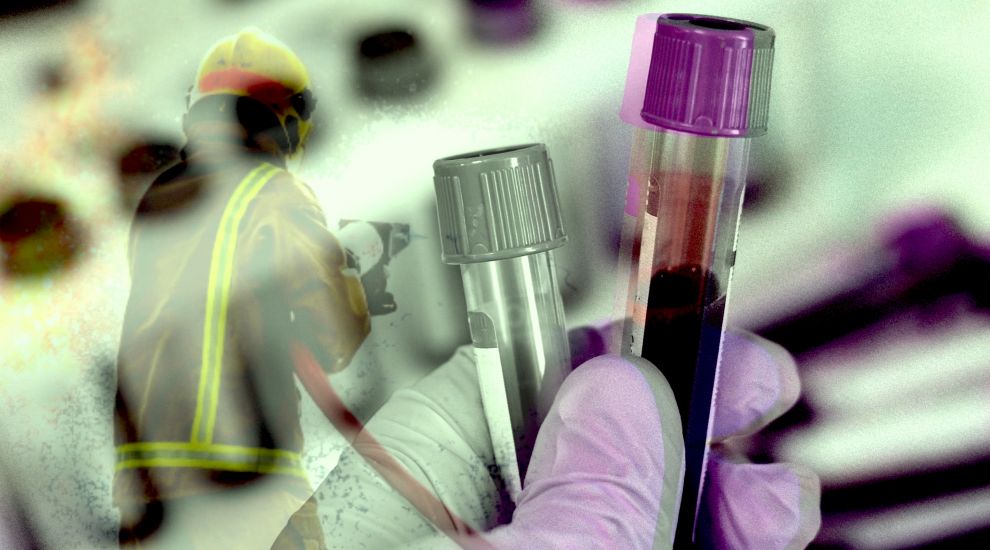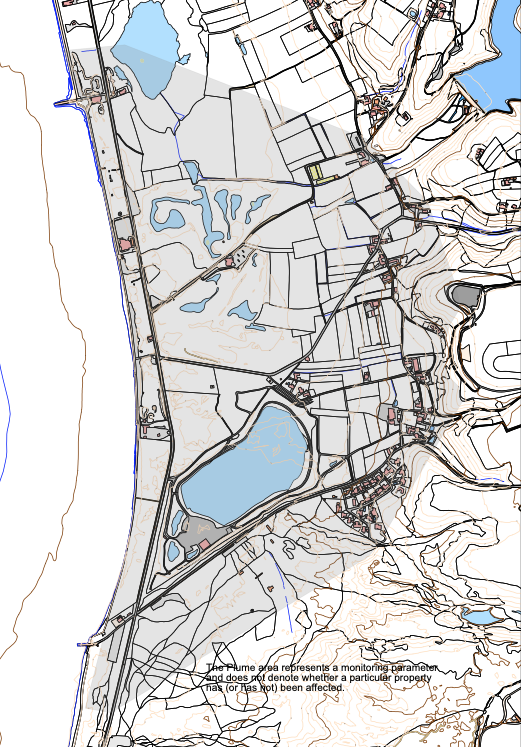


Half of the 72 islanders who had their blood tested for a toxic manmade chemical once sprayed at the Airport have high levels in their bodies.
The results of a £100,000 Government-sponsored testing programme have returned from a Californian laboratory and are being shared with those who participated this week.
They confirm what campaigners have long suspected: that people who regularly drank and used water from catchment areas close to the Airport have high levels of PFAS – a family of carbon-based chemicals that have been linked to cancer, thyroid, kidney and bladder problems, infertility, and birth defects in humans.
The Government has said that the results confirm what it already suspected, and it will now establish a panel of experts who can recommend next steps, including possible treatments.
However, Director of Public Health Professor Peter Bradley said that research into the impact of PFAS on health were still at an early stage so the Government could not yet offer specific medical advice to those affected.
For the moment, he said, the only firm decision would be to continue testing those who volunteered, after meeting a set of criteria, to have their blood sent to the US.

Pictured: The area of St. Ouen's Bay which is contaminated by PFOS, which was an ingredient of foam sprayed by firefighters at the Airport.
“We are seeing that, as expected, some residents have higher levels of PFAS in their blood than you would expect,” he said. “In order to reach that conclusion, which in itself is technically quite complicated, we have compared the samples with a reference population from the United States, which is the only one we have available internationally.”
He added: “We are taking the issue of PFAS seriously now, even though the position hasn’t changed for the vast majority of islanders. This is very much about those islanders who were affected by the pollution incident.
“The Government of Jersey is going to convene an advisory scientific panel, with some off-island expertise in order to keep track of the growing number of scientific studies that are being undertaken to investigate this issue.
“We are going to advise retesting for the islanders who are already tested because we do understand that levels can drop over time. The exact detail of that is something we will ask the panel to give us some advice on, such as when would be the next sensible time to be tested.”
Prof Bradley added that the Government would pay for those residents on boreholes to be connected to mains water.
Asked whether those who had elevated levels had high concentrations of PFAS in their blood, Prof Bradley replied: “There is quite a lot of international uncertainty over what having a raised PFAS blood level means, so it is not always clear on how we can interpret a result that comes back from the testing programme.
“What we do know is that, having done the testing, it gives people information and allows them to monitor their levels over time and that has been a particular concern of the islanders who have been affected by this incident.
“We have used a statistical technique to devise when people had a level that would not have been expected by chance, and that is how we have defined a higher level. That is not the same as saying that the actual measure we have is at a level which is more concerning than one that would less than that.
“The real question for me is what this means for people’s health, and that is the bit we cannot answer at the moment because the international evidence doesn’t give us a very clear conclusion. It why we want the scientific advisory panel.”
PFAS has been found to be in water supplies throughout the Island, especially around the Airport, where toxic firefighting foam was regularly sprayed until the early 1990s. Many residents living around the aerodrome believe their health has been affected by drinking water contaminated with PFAS, specifically one of the family called PFOS.
High levels of PFAS have been found in streams, ponds and boreholes in and around St. Ouen’s Bay and in the Pont Marquet water catchment, which runs from the Airport to St. Aubin.
Trace level of PFAS are found in mains water as water from contaminated boreholes in St. Ouen’s Bay is still pumped into reservoirs. However, Jersey Water has reduced the amount extracted from these sources, allowing it to be sufficiently blended with clean water to keep PFAS levels within internationally agreed limits.

Pictured: Contamination of boreholes in St. Ouen's Bay is preventing full extraction by Jersey Water.
However, critics not only argue that these limits are too high but also any level of PFAS is too high as the manufactured ‘forever chemical’ accumulates in the body and is very difficult to break down.
Jersey Water is testing new technology which will remove PFAS from water entirely. The company says that PFAS levels in drinking water comply with the very latest standards, including guidance from the World Health Organisation, which has just been published in draft form.
Emerging medical studies have suggested that removing blood and letting the body naturally replenish supply is an effective way of ridding it of PFAS.
St. Ouen’s Bay resident Sarah Simon is one of the 72 residents who supplied blood and has been a key campaigner calling for Government action. She is waiting to collect her results from her GP.
Pictured: St. Ouen's Bay resident Sarah Simon has been campaigning for blood testing of islanders for seven years.
She said: “I have a meeting with the Chief Minister on Wednesday to discuss the PFAS blood test results and what treatment should be made available to all those affected.
“Above all, it should not matter what the level of PFAS is in someone’s body; the fact is there shouldn’t be any and the sooner it is removed from both people’s bodies and the island’s water supplies, the better.”
Islander tests own blood in bid to prove chemical contamination
Comments
Comments on this story express the views of the commentator only, not Bailiwick Publishing. We are unable to guarantee the accuracy of any of those comments.